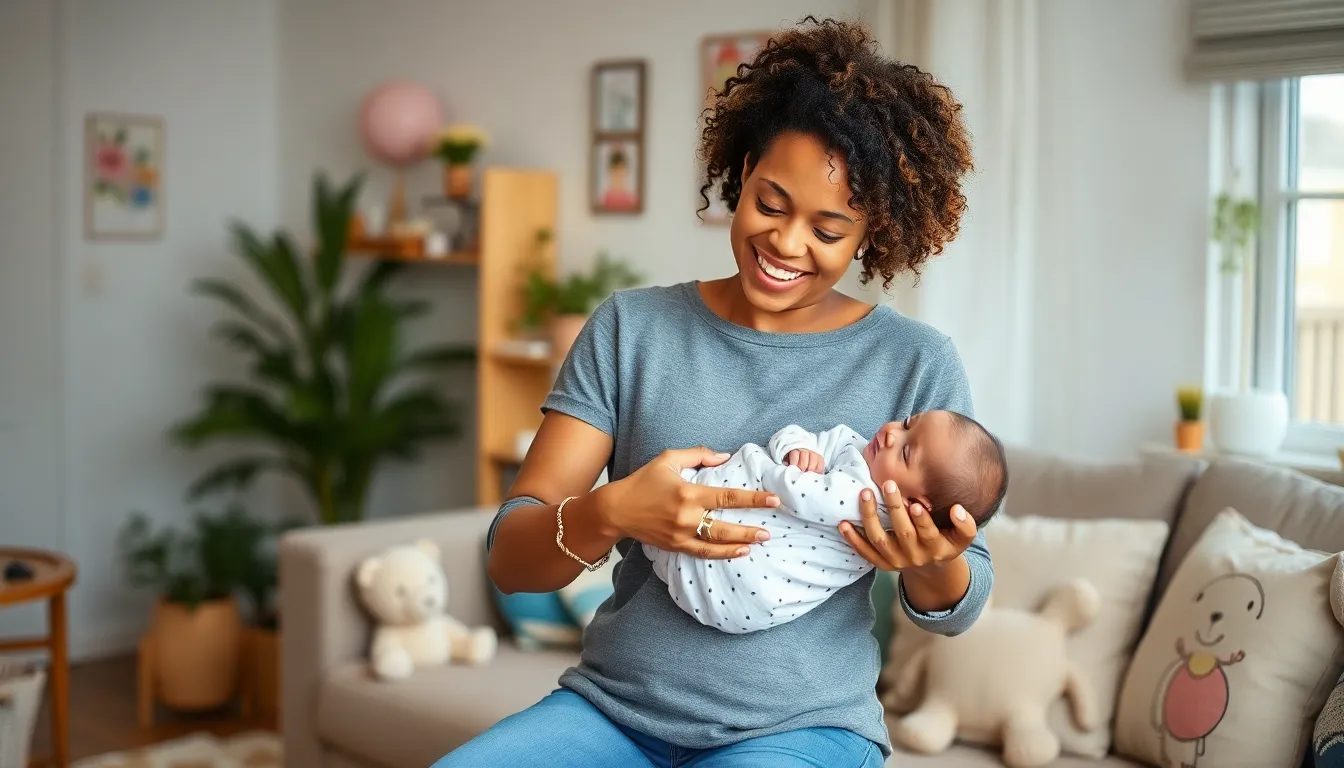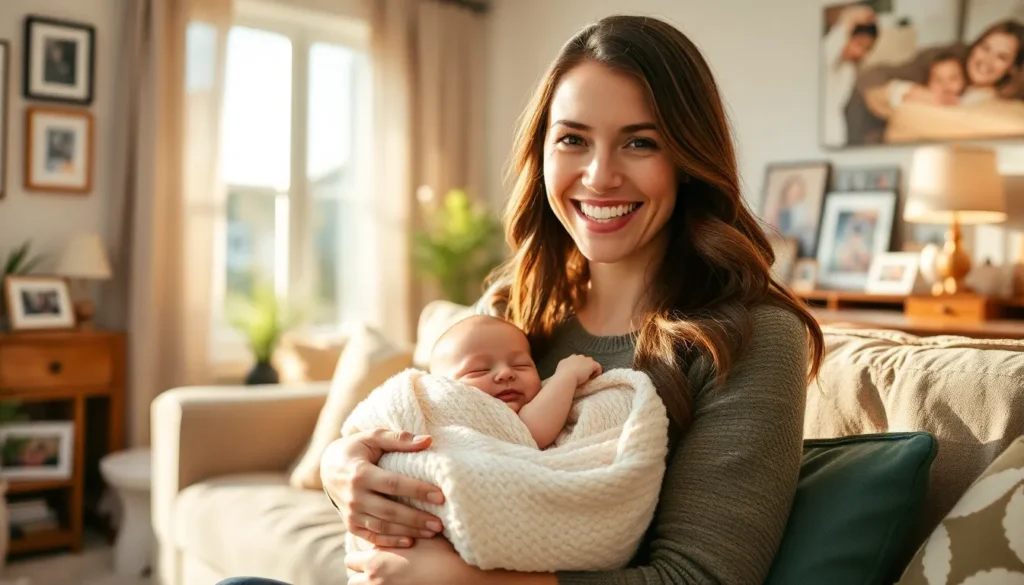Table of Contents
ToggleIn the world of fertility, donor egg success stories shine brighter than a diamond in a haystack. For many hopeful parents, these tales are not just heartwarming; they’re a beacon of hope. Imagine the joy of welcoming a little one into your life, all thanks to the selfless gift of a donor egg. It’s like finding the winning lottery ticket—except instead of cash, you get a tiny bundle of joy.
Understanding Donor Egg Success Stories
Donor egg success stories showcase the possibilities of achieving parenthood through assisted reproductive technology. These narratives inspire and offer hope for those facing fertility challenges.
What Are Donor Eggs?
Donor eggs refer to eggs retrieved from a woman who donates them to individuals or couples looking to conceive. The process involves selecting a suitable donor who meets specific health and genetic criteria. An egg donor undergoes ovarian stimulation to produce multiple eggs, which are then harvested. Once harvested, these eggs can be fertilized through in vitro fertilization (IVF) techniques. Using donor eggs allows intended parents to experience pregnancy and childbirth, even when they cannot use their own eggs.
Benefits of Using Donor Eggs
Using donor eggs presents various advantages for aspiring parents. Increased success rates occur since donor eggs often come from younger, healthier women. Many couples experience a higher likelihood of achieving pregnancy compared to using their own eggs, especially if age impacts fertility. Another benefit includes the opportunity for genetic connection through the sperm of the intended father. Intended mothers also gain the chance to carry a pregnancy, which fosters a unique bond. Overall, donor eggs serve as a powerful option in the journey toward parenthood.
Real-Life Success Stories

Donor egg success stories provide hope and inspiration for many aspiring parents facing fertility challenges. These narratives illustrate the power of assisted reproductive technology in transforming dreams into reality.
Inspiring Journey of a Single Mother
A single mother shared her heartwarming experience with donor eggs. After years of unsuccessful attempts to conceive, she decided to explore the option of donor eggs. With meticulous research and consultations, she found a perfect match. The process culminated in a successful IVF procedure, leading to the joyous arrival of her baby. This single mother’s journey highlights the emotional fulfillment that donor eggs can bring, demonstrating that parenthood is attainable for everyone, regardless of their circumstances.
Overcoming Infertility with Donor Eggs
Many couples facing infertility discovered donor eggs as a viable path to parenthood. A couple struggled with multiple failed IVF attempts due to age-related factors. They learned about the success rates linked with younger donor eggs and embraced this option. Their journey included selecting a donor who met their criteria and undergoing a successful fertilization process. Ultimately, they welcomed twins into their family, emphasizing the hope and possibilities made possible through donor egg usage.
Factors Contributing to Success
Multiple factors contribute to the success of donor egg procedures. Understanding these elements helps prospective parents navigate their journeys more effectively.
Age and Health of the Recipient
Recipient age plays a significant role in the overall success of donor egg utilization. Younger recipients typically experience higher success rates due to improved reproductive health metrics. Health conditions, such as obesity or chronic illnesses, can negatively impact pregnancy outcomes. Additionally, a balanced lifestyle, which includes proper nutrition, exercise, and avoiding harmful substances, increases the likelihood of a successful pregnancy. Regular evaluations by healthcare professionals also help manage health concerns. Optimizing the recipient’s health ensures that the embryo has a favorable environment for implantation and growth.
Quality of Donor Eggs
Donor egg quality directly influences the likelihood of successful pregnancy. Younger donors usually provide higher-quality eggs, with improved chromosomal integrity. The selection process often emphasizes donors aged between 18 and 30, as their eggs tend to showcase better success rates. Both physical examinations and psychological assessments are conducted to evaluate donor suitability. In addition to age, the donor’s health history significantly impacts egg quality. Higher quality donor eggs lead to higher chances of embryo viability and ultimately, successful pregnancies. Couples selecting eggs from rigorously screened donors increase their chances of achieving favorable outcomes.
Emotional and Psychological Aspects
Emotional and psychological factors significantly influence the experience of individuals using donor eggs. Understanding these aspects provides vital support throughout the fertility journey.
Coping with the Fertility Journey
Coping with infertility often brings a wave of diverse emotions, including anxiety and sadness. Individuals navigating this path find solace in connecting with support groups and sharing their experiences. Through these interactions, they recognize that they are not alone in their struggles. Many also engage in therapy, which enables them to address their feelings healthily and constructively. Mindfulness practices like meditation or yoga can provide relief from stress, promoting emotional balance during challenging times. Acknowledging milestones, such as starting a new IVF cycle, fosters positivity and hope for eventual success.
Building a Family Through Donor Eggs
Building a family using donor eggs presents unique emotional opportunities. Many individuals report an overwhelming sense of gratitude toward donors, recognizing their pivotal role in achieving parenthood. When a pregnancy occurs, an intense bond forms between the intended parent and the child, reinforcing feelings of connection. The journey often brings families closer together, as partners support one another through this transformative process. Both intending parents and their support networks share in the excitement, celebrating each step of the journey. Overall, using donor eggs not only helps create families but also fosters deeper emotional connections within families.
Donor egg success stories illuminate the path to parenthood for many individuals and couples facing fertility challenges. These narratives not only provide hope but also highlight the emotional journey that accompanies the decision to use donor eggs. The joy of welcoming a child into the world after overcoming obstacles is a testament to the resilience and determination of aspiring parents.
As more people share their experiences and triumphs, the stigma surrounding donor egg use continues to diminish. This growing acceptance fosters a supportive community where individuals can find encouragement and inspiration. Ultimately, donor eggs represent a viable and heartwarming option for those seeking to create their families, proving that love and connection can flourish in diverse ways.







